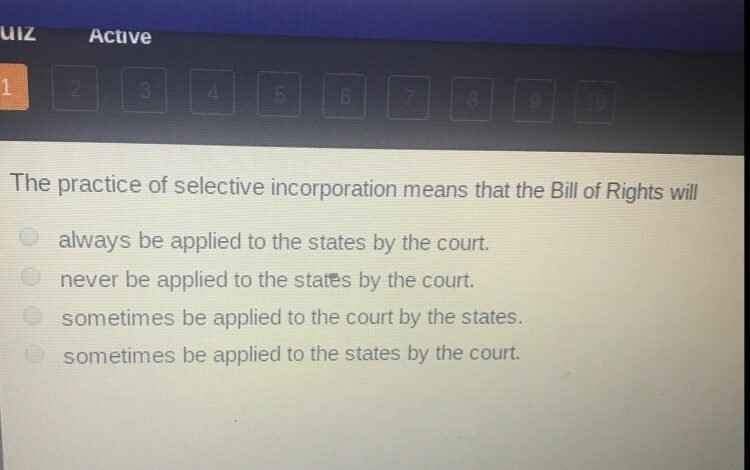The Practice Of Selective Incorporation Means That The Bill Of Rights Will Protect Individual Liberties

The practice of selective incorporation means that the Bill of Rights applies to states. It ensures citizens’ rights are protected at all levels of government.
Selective incorporation is a legal doctrine. This doctrine uses the Fourteenth Amendment to apply Bill of Rights protections to state laws. Before this practice, states could ignore some federal protections. Today, selective incorporation makes sure states follow the same rules as the federal government.
This practice has shaped American law over decades. Understanding it helps us see how our rights are upheld. Stay with us to learn more about this crucial legal principle.
Selective Incorporation Explained
Selective incorporation is a legal doctrine. It ensures that states cannot enact laws that infringe on the rights protected by the Bill of Rights. This process makes certain protections from the Bill of Rights applicable to the states through the Fourteenth Amendment.
Historical Background
Before the Civil War, the Bill of Rights only applied to the federal government. States had their own constitutions and protections. This changed after the Civil War, with the adoption of the Fourteenth Amendment in 1868.
The Fourteenth Amendment introduced the concept of equal protection under the law. It aimed to protect the rights of former slaves. Over time, the Supreme Court interpreted this amendment to apply parts of the Bill of Rights to the states.
Legal Framework
Selective incorporation relies on the Due Process Clause of the Fourteenth Amendment. The Supreme Court uses this clause to determine if a right is fundamental. If deemed fundamental, states must adhere to it.
Not all rights from the Bill of Rights are incorporated. The court decides on a case-by-case basis. For example, the First Amendment’s free speech protection is incorporated. The Second Amendment’s right to bear arms is also incorporated.
Selective incorporation has expanded over time. It ensures that state laws do not violate fundamental freedoms. This process helps protect individual rights across the entire country.

Credit: brainly.com
Origins Of The Bill Of Rights
The Bill of Rights holds significant importance in American history. It ensures the protection of individual liberties. Understanding its origins helps us appreciate these freedoms more deeply. This section dives into the beginnings of the Bill of Rights.
Founding Fathers’ Intentions
The Founding Fathers wanted to protect citizens’ freedoms. They aimed to limit government power. Their goal was to create a fair and just society. They believed these rights were essential for democracy. James Madison played a key role. He drafted many of the amendments. These ideas were inspired by earlier documents. The Magna Carta and English Bill of Rights influenced them. The Founding Fathers wanted to ensure these rights for all Americans.
Ratification Process
The ratification process was not easy. States had different views. Some were concerned about too much central power. Others worried about individual rights. Intense debates occurred. These debates shaped the final document. In 1789, Congress proposed twelve amendments. Ten of these were ratified by the states. By 1791, the Bill of Rights became part of the Constitution. This process showcased the importance of compromise. It also highlighted the value of protecting individual liberties.
14th Amendment Significance
The 14th Amendment is a cornerstone of American constitutional law. It plays a crucial role in ensuring the Bill of Rights applies to the states. This process is known as selective incorporation. Let’s explore its significance through its key clauses.
Equal Protection Clause
The Equal Protection Clause ensures that no state denies any person equal protection under the law. It aims to eliminate discrimination and promote fairness. This clause has been vital in various landmark cases. It has helped to protect civil rights and promote equality.
Due Process Clause
The Due Process Clause is another essential part of the 14th Amendment. It safeguards individuals from state actions that could deprive them of life, liberty, or property without due process of law. This clause ensures fair treatment through the judicial system. It has been pivotal in expanding personal freedoms and rights.
Credit: www.gauthmath.com
Landmark Supreme Court Cases
The practice of selective incorporation is crucial in American law. It ensures that states honor the Bill of Rights. Landmark Supreme Court cases have shaped this practice. These cases highlight the importance of constitutional rights for all citizens.
Gitlow V. New York
The case of Gitlow v. New York in 1925 was significant. Benjamin Gitlow was arrested for distributing a manifesto. This manifesto called for socialism through strikes and class action. New York charged Gitlow with criminal anarchy.
Gitlow argued that his First Amendment rights were violated. The Supreme Court ruled that states must respect the First Amendment. This was a major step towards selective incorporation. It meant that states could not infringe on free speech.
Mapp V. Ohio
The case of Mapp v. Ohio in 1961 was a landmark ruling. Police searched Dollree Mapp’s home without a warrant. They found illegal materials and charged her.
Mapp argued that the search violated her Fourth Amendment rights. The Supreme Court agreed. This ruling required states to follow the Fourth Amendment. It reinforced the need for lawful search and seizure procedures.
| Case | Year | Amendment Impacted | Significance |
|---|---|---|---|
| Gitlow v. New York | 1925 | First Amendment | States must respect free speech |
| Mapp v. Ohio | 1961 | Fourth Amendment | States must follow lawful search procedures |
These cases are just a few examples. Selective incorporation ensures that all citizens enjoy their constitutional rights. The Supreme Court continues to play a key role in this process.
Impact On Individual Liberties
The practice of selective incorporation has a profound impact on individual liberties. This legal doctrine ensures that the protections of the Bill of Rights apply to state governments. It safeguards individual freedoms against state actions. Let’s explore how selective incorporation affects freedom of speech and the right to privacy.
Freedom Of Speech
Selective incorporation strengthens freedom of speech. This means state laws cannot easily restrict what you say. The First Amendment protects you from censorship. It prevents states from limiting your expression. This protection covers spoken words, written text, and even symbolic speech. Courts have ruled many times to defend this freedom against state interference.
Right To Privacy
The right to privacy is another critical area. This right is not explicitly stated in the Constitution. Yet, the courts have interpreted it from several amendments. Selective incorporation ensures states respect this right. It includes personal decisions about marriage, family, and your body. This protection limits state power. It upholds your personal freedom and autonomy.
Controversies And Debates
The practice of selective incorporation has sparked many controversies and debates. It involves applying the Bill of Rights to states through the Fourteenth Amendment. This complex legal process has led to various discussions about its impact on state and federal powers.
State Vs. Federal Power
One of the main controversies is the balance of power. Selective incorporation shifts power from states to the federal government. States argue they should have the right to govern themselves. They believe that federal intervention undermines their authority. On the other hand, supporters argue it ensures uniform protection of rights. This ongoing debate continues to shape the landscape of American politics.
Judicial Activism
Another heated debate involves judicial activism. Critics claim that selective incorporation grants too much power to judges. They argue that unelected judges should not make decisions impacting state laws. Supporters, however, see it as a way to protect individual rights. They believe that courts play a crucial role in safeguarding freedoms. This debate highlights the tension between judicial power and democratic principles.
Modern-day Applications
The practice of selective incorporation means that the Bill of Rights applies to states. This application is still evolving. New court cases and legal challenges continue to shape its landscape. Understanding modern-day applications helps grasp its current relevance.
Recent Court Decisions
Recent court decisions have played a key role in selective incorporation. Let’s look at some important cases:
| Case | Year | Outcome |
|---|---|---|
| McDonald v. Chicago | 2010 | Second Amendment applies to states |
| Timbs v. Indiana | 2019 | Eighth Amendment applies to states |
These decisions show the ongoing nature of selective incorporation. Each case strengthens the application of the Bill of Rights to states.
Current Legal Challenges
Many legal challenges are still active. They focus on different amendments and rights. Here are a few:
- Freedom of Speech – How states handle hate speech and protests.
- Right to Privacy – State laws on digital privacy and data protection.
- Due Process – Fair treatment in state legal systems.
These challenges reflect the dynamic nature of selective incorporation. New issues keep emerging, demanding attention and resolution. Courts must address these issues to ensure rights are upheld. This makes selective incorporation an ever-evolving practice.
Future Of Selective Incorporation
The practice of selective incorporation has shaped the application of the Bill of Rights to the states. But what does the future hold for this significant legal doctrine? Legal scholars and experts foresee changes and adaptations that could redefine its scope. The evolution of selective incorporation will likely involve potential reforms and evolving legal interpretations.
Potential Reforms
Potential reforms may address inconsistencies in applying the Bill of Rights to states. Some believe that a more uniform approach is necessary. Others argue for a case-by-case method. This debate may lead to legislative changes. Lawmakers could propose new guidelines. These guidelines would aim to create clarity and consistency.
Evolving Legal Interpretations
Courts play a crucial role in the future of selective incorporation. Judges interpret the Constitution in light of new societal challenges. These interpretations may evolve over time. New rulings could change how rights are protected at the state level. This process is dynamic. It reflects the changing values and needs of society.
Selective incorporation remains a vital part of American jurisprudence. Its future will be shaped by ongoing reforms and legal interpretations. Both aim to ensure that the Bill of Rights continues to protect individual freedoms effectively.

Credit: study.com
Frequently Asked Questions
What Is Selective Incorporation?
Selective incorporation is a constitutional doctrine. It ensures states cannot enact laws that infringe on the Bill of Rights.
Why Is Selective Incorporation Important?
Selective incorporation protects individual rights. It ensures state and local governments respect the Bill of Rights.
How Does Selective Incorporation Work?
Selective incorporation uses the Fourteenth Amendment. It applies specific rights from the Bill of Rights to the states.
Which Amendments Are Incorporated?
Most Bill of Rights amendments are incorporated. This includes freedom of speech and the right to a fair trial.
Conclusion
Selective incorporation ensures that the Bill of Rights protects individuals. This practice strengthens individual freedoms across the states. Each right is carefully applied to prevent state infringements. This process promotes fairness and justice. Knowing your rights helps you understand your protections.
Stay informed, stay protected. The Bill of Rights continues to evolve with society. Selective incorporation plays a key role in this evolution. It bridges the gap between federal and state laws. Understanding this practice is crucial for all citizens. Protect your rights by staying educated.
Rights are for everyone, everywhere.



